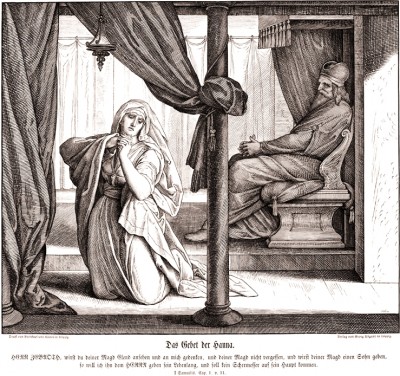I Samuel :1-20
There is a saying that when you point your finger at someone there are three pointed right back at you. Try it and you’ll see!
It seems like we see this every week or so in the cases of virulently anti-LGBT crusaders who are found to be gay themselves. It’s solid psychology. When the subconscious, or shadow side, is repressed people compensate with defensive mechanisms. One of the things they may do is develop strong feelings against the things they most hate in themselves. I suspect we all do it to some extent.
There’s an example of this in today’s reading about Eli and Hannah meeting in the temple.
The story is that Eli had two sons. His sons were priests, but they were not very good priests: They took more than their share of the offerings, they had sex with the women who worked at the entrance to the tabernacle, they did not obey their father, and they were drunks. They were so bad that today’s readings call them “the sons of Belial.” (Belial would later become The Devil in religious mythology, though the writer of Samuel couldn’t have known that. He probably thought that Belial just meant the shadow side, or the yetzer hara, that we all have, or that the two sons were simply worthless.)
Eli was a good man, and wanted his sons to be good priests. He had tried to get them to curb their behavior, but things had more or less gotten out of hand. Sometimes when there is something important happening in our lives it is hard to think of anything else. Eli must have spent a lot of time thinking about his sons and their behavior. As the story progresses we see that Hophni and Phineas not only go on to lose a war with the Philistines—they lose the ark of the covenant too! So, this is just the beginning of a long, sad road for Eli.
Hannah, on the other hand, didn’t have any sons. She wanted a son very badly, and one day she went to the temple to pour her heart out to God about it. Hannah prayed and wept bitterly before God. She was in a state of such earnest prayer that she must have forgotten herself somewhat, and her lips started moving even though her words were silent.
Instead of having compassion for Hannah, Eli upbraided her for making a drunken spectacle of herself. This perceived drunkenness, of course, was the very thing he had no control over in his own life: his sons’ drunkenness, his worthless sons of Bilal.
Hannah answered Eli by saying “Do not regard me, your servant, as a daughter of Bilal.” In other words, “I am not one of your drunken sons.” She may have added, “How dare you dismiss me so easily just because I am a woman, wounded, and bitter. You should take care of the shadows in your own family before you worry about me.”
Eli realized what he’d done and he backed off. He even gave Hannah a blessing. Hannah eventually had sons, and so the story ends well enough. But what about us? Where are your fingers pointing today? What do you condemn? Do you see those things in yourself? Are there condemning fingers pointing at you?
Knowing that the things we hate in others are also the things we hate in ourselves can help us develop compassion both for them and for ourselves.
If you have been judgmental like Eli, then do what he did and stop judging others. Instead of judgment, offer a blessing instead.
If you have had fingers pointed at you like Hannah did, understand that the finger-pointers hate themselves more than they hate you, and pray for them.
Linda “Lindy” McMillan lives in Shanghai, China.
Image: Hannah’s Prayer in the Temple / Julius Schnorr von Carolsfeld (mid 19th century), public domain

